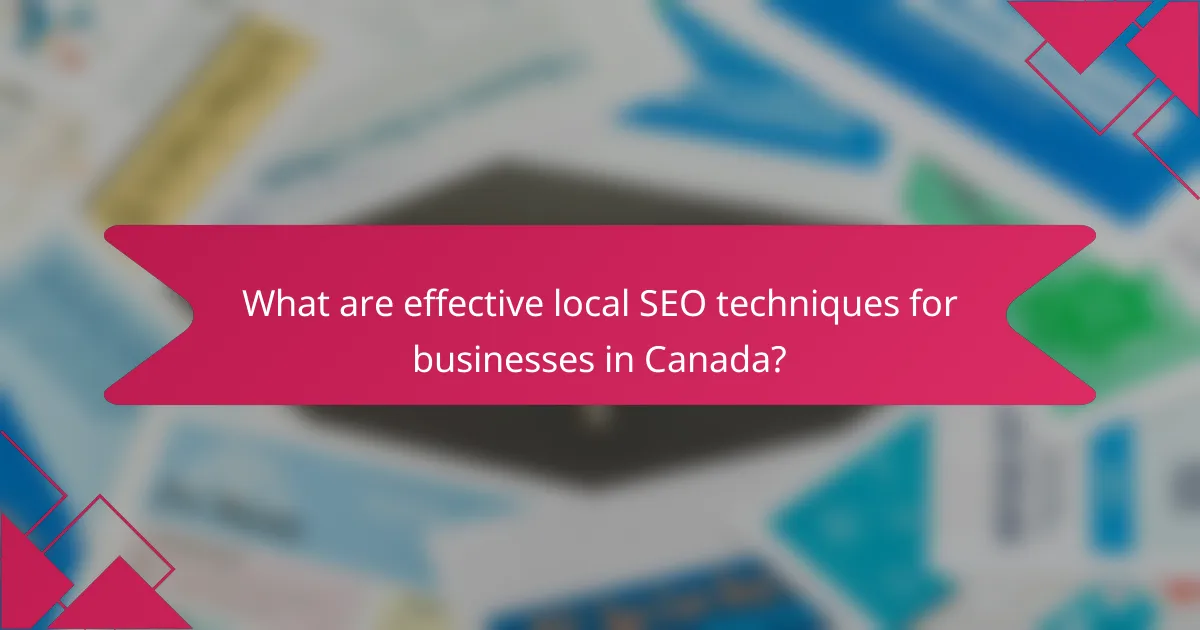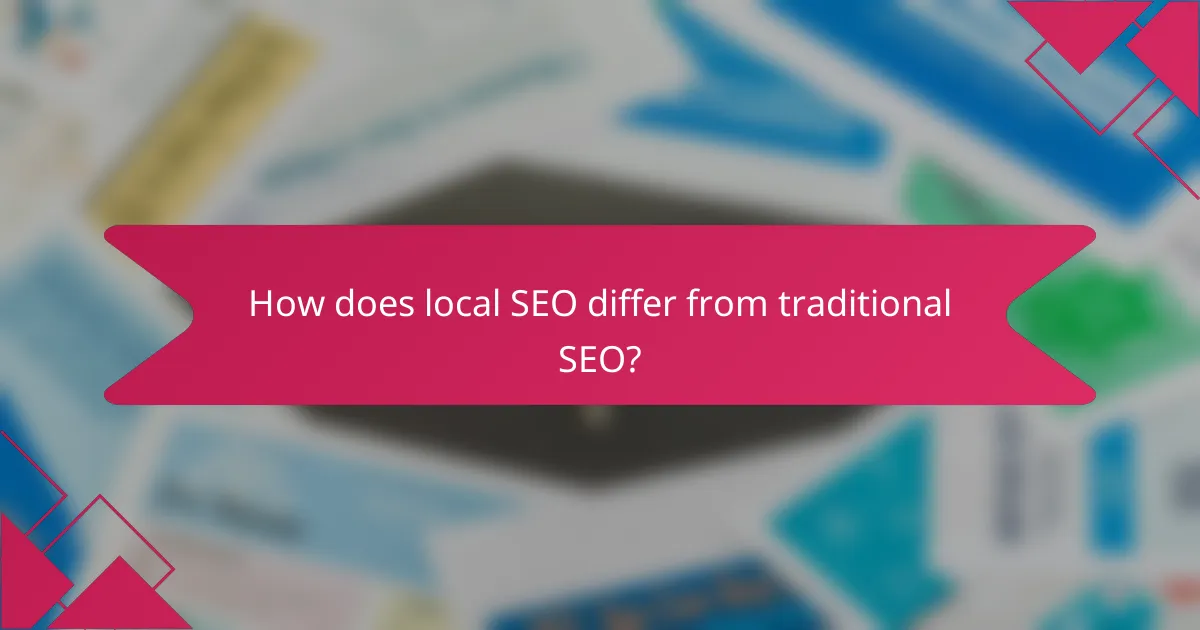Local SEO techniques are essential for businesses aiming to improve their online presence within specific geographic areas. By optimizing strategies such as Google My Business listings and leveraging specialized tools, companies can effectively attract more customers from their local communities. Implementing these best practices not only enhances visibility but also fosters stronger connections with potential clients.

What are effective local SEO techniques for businesses in Canada?
Effective local SEO techniques for businesses in Canada focus on enhancing online visibility within specific geographic areas. By implementing strategies tailored to local search behaviors, businesses can attract more customers from their communities.
Google My Business optimization
Optimizing your Google My Business (GMB) listing is crucial for local SEO. Ensure your business name, address, and phone number (NAP) are accurate and consistent. Include high-quality images, business hours, and a detailed description to improve your visibility in local search results.
Regularly update your GMB profile with posts about promotions or events. Engaging with customers through Q&A and responding to reviews can also enhance your listing’s effectiveness.
Local keyword research
Conducting local keyword research helps identify the terms potential customers use when searching for your products or services. Use tools like Google Keyword Planner or Ubersuggest to find relevant keywords that include location-specific phrases.
Focus on long-tail keywords that reflect local intent, such as “best coffee shop in Toronto.” Incorporating these keywords into your website content, meta descriptions, and GMB listing can significantly improve your local search rankings.
NAP consistency
Maintaining NAP consistency across all online platforms is vital for local SEO. Ensure that your business name, address, and phone number are identical on your website, social media, and directories like Yelp and Yellow Pages.
Inconsistencies can confuse search engines and potential customers, leading to lower rankings. Regularly audit your listings to correct any discrepancies and enhance your credibility.
Localized content creation
Creating localized content helps connect your business with the community. Write blog posts or articles that address local events, news, or topics relevant to your audience. This not only improves SEO but also positions your business as a local authority.
Consider using local landmarks or cultural references in your content to resonate with your audience. This approach can increase engagement and encourage shares, further boosting your local SEO efforts.
Customer reviews management
Managing customer reviews is essential for building trust and improving local SEO. Encourage satisfied customers to leave positive reviews on platforms like Google and Yelp, as these can influence potential customers’ decisions.
Respond to reviews, both positive and negative, to show that you value customer feedback. A proactive approach can enhance your reputation and signal to search engines that your business is active and engaged with its clientele.

How can I improve my Google My Business listing?
Improving your Google My Business listing involves optimizing key elements to enhance visibility and attract more customers. Focus on providing complete information, high-quality images, and engaging content through Google Posts.
Complete business information
Ensure that your business information is fully completed and accurate. This includes your business name, address, phone number, website, and operating hours. Consistency across all platforms is crucial, as discrepancies can confuse potential customers and affect your search rankings.
Consider adding additional details such as your business category, attributes (like “wheelchair accessible”), and a description that highlights your unique offerings. This information helps Google understand your business better and match it with relevant searches.
Add high-quality images
High-quality images can significantly enhance your Google My Business listing, making it more appealing to potential customers. Aim to include a variety of images, such as your storefront, interior, products, and team members. Listings with images receive more engagement, leading to higher click-through rates.
Regularly update your images to reflect seasonal changes or new offerings. Aim for images that are well-lit, clear, and represent your brand accurately. Consider using professional photography if possible, as this can elevate your listing’s overall quality.
Utilize Google Posts
Google Posts allow you to share updates, promotions, and events directly on your Google My Business listing. This feature can engage customers and encourage them to take action, such as visiting your website or making a reservation. Regular posting can keep your audience informed and interested.
When creating posts, keep your content concise and visually appealing. Use clear calls to action and include relevant images or links. Aim to post at least once a week to maintain visibility and engagement with your audience.

What tools can enhance local SEO efforts?
Several tools can significantly improve local SEO efforts by streamlining keyword tracking, citation management, and reputation management. Utilizing these tools effectively can help businesses enhance their visibility in local search results and connect with potential customers more efficiently.
SEMrush for keyword tracking
SEMrush is a powerful tool for tracking local keywords and analyzing their performance. It allows businesses to identify which keywords are driving traffic and conversions in specific geographic areas. By focusing on local search terms, companies can tailor their content and marketing strategies to meet the needs of their target audience.
To maximize SEMrush’s effectiveness, regularly monitor keyword rankings and adjust your strategy based on performance data. Consider using the tool’s position tracking feature to keep an eye on competitors and discover new opportunities for local keywords.
Moz Local for citation management
Moz Local helps businesses manage their online citations, ensuring that their information is consistent across various platforms. This tool can identify discrepancies in business listings, which is crucial for local SEO since search engines prioritize accurate information. Maintaining consistency in name, address, and phone number (NAP) across directories can improve local search rankings.
To use Moz Local effectively, regularly audit your citations and update any incorrect information. Aim to have your business listed on major platforms such as Google My Business, Yelp, and Bing Places, as well as industry-specific directories relevant to your locale.
BrightLocal for reputation management
BrightLocal is designed to help businesses manage their online reputation by monitoring reviews and ratings across various platforms. Positive reviews can enhance local SEO by signaling trustworthiness to search engines and potential customers. BrightLocal allows businesses to respond to reviews, which can foster customer engagement and loyalty.
To leverage BrightLocal effectively, set up alerts for new reviews and respond promptly to both positive and negative feedback. Encourage satisfied customers to leave reviews, as a higher volume of positive reviews can significantly impact local search rankings.

What are the best practices for local link building?
Effective local link building involves strategies that enhance your online presence within your community. Focus on creating relationships and engaging with local entities to earn high-quality backlinks that improve your local search rankings.
Engage with local influencers
Connecting with local influencers can significantly boost your link-building efforts. These individuals often have a strong following and can share your content, providing valuable backlinks and increasing your visibility.
To engage with influencers, start by identifying those relevant to your industry or niche. Reach out with personalized messages, offering collaboration opportunities or content that would interest their audience.
Participate in community events
Involvement in community events is a practical way to build local links. Sponsoring or participating in local festivals, charity runs, or workshops can lead to mentions and backlinks from event websites and local news outlets.
Ensure you promote your participation on your website and social media, and ask event organizers to link back to your site. This not only builds links but also strengthens your brand’s local reputation.
Collaborate with local businesses
Forming partnerships with local businesses can create mutual benefits in link building. Joint promotions, co-hosted events, or shared content can lead to backlinks from each other’s websites, enhancing local SEO.
When collaborating, choose businesses that complement your services. For example, a local bakery could partner with a coffee shop for a promotional event, allowing both to link to each other’s sites and reach a broader audience.

What metrics should I track for local SEO success?
To measure local SEO success, focus on metrics that reflect your visibility in local search results, user engagement, and lead conversion. Key metrics include local search rankings, website traffic from local searches, and conversion rates from local leads.
Local search rankings
Local search rankings indicate how well your business appears in local search results, particularly in Google Maps and local pack listings. Regularly monitor your rankings for relevant keywords and phrases that potential customers might use to find your services.
Tools like Google Search Console and local SEO software can help track these rankings. Aim for a position within the top three results for optimal visibility, as most users tend to click on these listings.
Website traffic from local searches
Website traffic from local searches measures the number of visitors who arrive at your site through local search queries. This metric is crucial as it reflects the effectiveness of your local SEO efforts in driving relevant traffic.
Utilize Google Analytics to track this traffic source. Look for trends over time and consider optimizing your website content and local listings to increase this traffic, aiming for a steady growth rate of at least 10-20% per quarter.
Conversion rates from local leads
Conversion rates from local leads represent the percentage of visitors who take a desired action, such as making a purchase or filling out a contact form. This metric is vital for assessing the effectiveness of your local SEO in generating actual business.
To improve conversion rates, ensure your website is user-friendly, mobile-optimized, and contains clear calls to action. A conversion rate of 5-10% is generally considered good for local businesses, but this can vary by industry.

How does local SEO differ from traditional SEO?
Local SEO focuses on optimizing a business’s online presence to attract customers from specific geographic areas, while traditional SEO aims for broader visibility across the internet. This means local SEO strategies prioritize local search terms, Google My Business listings, and location-based content to connect with nearby users.
Focus on local intent
Focusing on local intent involves understanding what potential customers are searching for in their specific area. This includes using keywords that reflect local terms, such as “best pizza in [city]” or “plumbers near me.” By aligning content with these local queries, businesses can improve their chances of appearing in relevant search results.
To effectively target local intent, consider incorporating location-specific phrases into your website’s content, meta descriptions, and titles. Additionally, creating content that highlights local events, news, or community involvement can further establish relevance and authority in your area.
Common pitfalls include neglecting to update your Google My Business profile or failing to gather local reviews. Regularly engaging with customers and responding to reviews can enhance your local presence and foster trust within the community.










